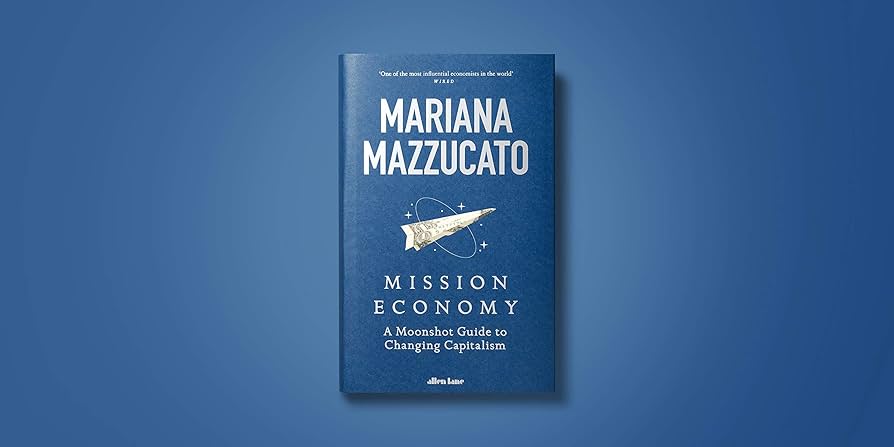Mazzucato’s Mission Economy offers a compelling vision for a new model of capitalism that is more focused on solving the grand challenges facing our world than lining our pockets; such as climate change, inequality, and poverty – which are all linked to the grand theme of a sustainable world. She argues that the traditional model of capitalism, which is focused on short-term profits, is no longer fit for purpose and that we need to transition to a “mission economy” in which government, businesses, and civil society work together to achieve shared goals.
Mazzucato’s book is full of insights and examples that support her argument. She points out that the government has played a vital role in driving innovation and economic growth, and that it should be more involved in supporting high-risk, high-reward projects that are essential for solving the grand challenges facing our world. She also provides examples of how the mission economy has been successfully implemented in practice, such as the development of the internet and the COVID-19 vaccine.
From the point of view of achieving a sustainable world and economy, Mission Economy is a very important book. She argues that mission economy is essential for addressing the climate crisis and other environmental challenges. She points out that the government has a responsibility to invest in clean energy and sustainable infrastructure, and that businesses and civil society also have a role to play in creating a more sustainable economy.
Mazzucato’s book is not without its flaws. Some critics have argued that her vision of the mission economy is too idealistic (which is sorely needed) and that it does not provide a clear roadmap for how to implement its proposals, but personally I think we need such grand ideas to start with. A grand vision will help us achieve something bigger, instead of the temporary and short-sighted solutions we’re seeing. Others have argued that her focus on the government’s role in innovation is misplaced and that the private sector is also essential for driving economic growth.
Despite these flaws, Mission Economy is an important book that offers a much-needed challenge to the status quo. It is a must-read for anyone who is interested in creating a more sustainable world and economy.
Here are some additional thoughts on the book from the point of view of achieving a sustainable world and economy:
- Mazzucato’s emphasis on the importance of government investment in clean energy and sustainable infrastructure is spot on. The government has a responsibility to lead the way in the transition to a low-carbon economy, and it can do this by investing in research and development, providing tax breaks and subsidies, and setting regulatory standards.
- Mazzucato also highlights the importance of businesses and civil society in creating a more sustainable economy. Businesses can invest in sustainable technologies and practices, and they can also work to educate consumers about the importance of sustainability. Civil society groups can advocate for sustainable policies and practices, and they can also help to raise awareness of the climate crisis and other environmental challenges.
- The mission economy is not a perfect solution to the challenges of sustainability, but it is a step in the right direction. It is a framework for thinking about economic development that puts the needs of people and the planet first. It is a framework that can help us to create a more just, equitable, and sustainable future.
I hope you enjoyed this review. Please visit again soon.

